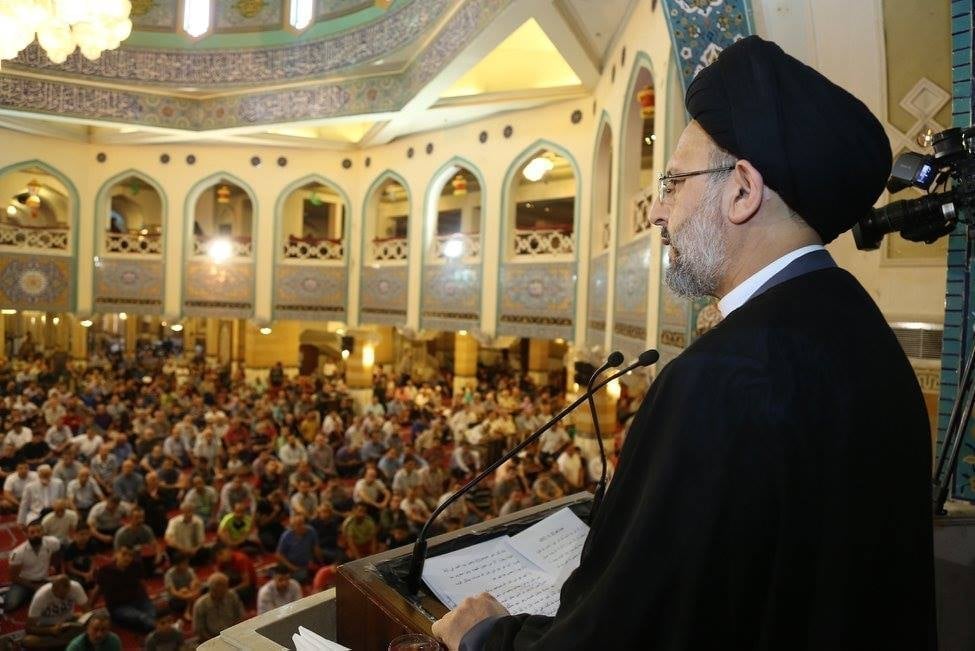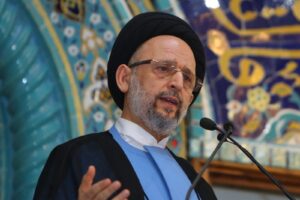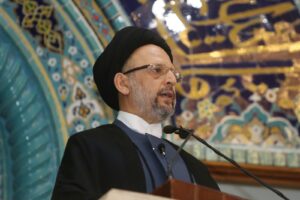The virtue of advice
His Eminence, Sayyed Ali Fadlullah, delivered the two Friday prayer sermons at the Imamain Al-Hassanain Mosque, Rabi’ Al-Awal, 6 1442 H. – October 23, 2020 Several prominent religious scholars, dignitaries and thousands of believers attended the Jumu’a prayer. Following is the edited text of the two speeches
The first speech
Allah, the Most Exalted, says in His Glorious Book: And We made them leaders guiding by Our command. And We inspired to them the doing of good deeds, establishment of prayer, and giving of ZakaT
; and they were worshippers of Us. Allah, the Most Exalted, speaks the truth.
We commemorate on the eighth of the month of Rabi Al-Awal a sad anniversary … that of the death of the eleventh Imam of Ahl el-Beit, Al-Hassan b.Ali Al-Askari
Yet this Anniversary is associated with another occasion that is dear to the followers of Ahl El- Beit that of the beginning of the Imamate of Imam Al-Mahdim which will continue until Allah, The Most Exalted, inherits the earth…
Imam Al-Askari was distinguished, like all the Imams of Ahl el-Beit, by his scholarship, worshipping, sublime manners, modesty, giving …etc. which gave him a highly respected status and earned him the love of all his contemporaries, including even his enemies.
This made his contemporary Abbasid caliphs fear him, for he unveiled their mistakes and sins. This fear increased as the Hadiths quoting the Messenger (p.) and the Imams had it that Imam Al-Mahdi who would fill the earth with justice is a son of his.
Thus, the Imam suffered in his short period of Imamate that lasted for six years from oppression, for he was imprisoned and prevented from seeing people, to the extent that he said to his followers: ‘No one should ever greet me or point to me, because you are not safe’.
All these severe pressures did not prevent the Imam from performing his missionary role in facing all deviations that inflicted Islam in its doctrine and concepts having been distorted by the rule of the Abbasid and the Omayyad before them.
Another role which was not less important was preparing in secrecy for the birth of his son, Al-Mahdi (a.s), and ensuring the favorable circumstances for him to be the next Imam , especially in his first disappearance that lasted for 69 years.
Today we are going to focus on one of his advice concerning the way one should adopt when criticizing or offering advice. The Imam (a.s)says:‘The person who admonishes his brother [friend] privately honors him, and the person who admonishes him publicly slights him…’
By this advice, the Imam wanted to highlight the duty of every believer to advice his fellow believers. The Hadith says: ‘Muslims are brethren’ and ‘serve as each other’s eye and guide’… Another Hadith says that those who advise Allah, The Most Exalted’s creation enjoy a high status on the Day of Judgment.
Advice can involve the religious aspect, but also the economic, political or private ones, such as marriage divorce and work…But the Imam did not only urge people to provide advice, but he also called for choosing
the way one expresses his criticism, to avoid negative reactions, for it could offend those one criticized or he could consider it a kind of show–off or arrogance… For the advice to be accepted, the Imam (a.s), wanted the criticism to be made in private, and not as what is going on nowadays; that is on the social media or the press or in public meetings. For correcting a mistake does not justify violating people’s dignities.
Such an approach provides a better chance for the advice to be accepted. It also shows that the advisor has good intentions and does not wish to hurt the advised even if indirectly. And this is the approach that the Messenger(p.) adopted. When he wanted to criticize a person or a group, he did not point to them by their names. Instead, he used to wonder how come these people have done so and so.
Furthermore, one should not exaggerate when talking about the negative points he sees in the one he wants to advise. Instead, he should start with the positive points such as saying: You, my brother, have a lot of talents, virtues and abilities, but you might have not been aware of this point…
The criticism itself must be gentle and carefully and beautifully worded. Harsh or abusive talk will not lead to the desired result. And it could very well lead to the opposite, creating a tension between the advisor and the advised. The Hadith says: Kindness is not to be found in anything but that it adds to its beauty and it is not removed from anything but it makes it defective.
The Imam provided an example of the kind and loving criticism that respects the other, even if he was his staunch enemy and reaches his heart. The Abbasids asked the jail warden to persecute the Imam. However, the former had this to say: “I have asked two of the most evil persons on earth to handle him, but after they came in contact with him they started to spend their time in praying…
Dear loved ones: It is our duty to correct the mistakes, thoughts and behavior of those around us. We should not neglect these mistakes, aim to score points or talk in an irresponsible way. We should act as reformers who point out to the mistakes in the way that is best, seeking Allah, The Most Exalted’s, satisfaction to become as God wishes the nation that provides good for others even if they do not ask for it ;the nation that enjoins good and forbids evil. You are the best of the nations raised up for (the benefit of) men; you enjoin what is right and forbid the wrong and believe in Allah, The Most Exalted.
The second speech
Worshippers of Allah, The Most Exalted, I advise you and myself with what Imam Al-Askari advised his followers before he died: I recommend you to obey God, be pious in your religion, and to let the diligence be for God. Be honest in your speeches, trustworthy in performing the consignment for the one who trusted you whether he was pious or dissolute, prolong your prostration while praying, and deal with others with the best behavior the same as Prophet Muhammad (p.) used to do. Besides, you should pray with those whom you think to be your opposition, and attend their funerals ceremonies, and visit their patients, and give them their rights, because if the man was pious in his religion, and sincere in his speeches, and performed the consignment, and treated the people in a good way, then people will say that he is a Shiite, and this will let me be proud of him. Hence, fear God, and be as adornment on behalf of us and be not as shame that defames our name. You should let all people like us and repulse every shame about us, because every good thing is concerned with us, and what is said about us as bad is not related to us in which the Holy Quran, which we should obey all what is stated in it, mentioned us and we are relatives with Prophet Muhammad (p.), and God purify us and every one who allege that will be lying. You should always extol God, and you should neither forget death nor recital the Holy Quran, and you should praise Prophet Muhammad and his family because this will let gain a lot of charities. Finally, work by what I recommended you to do, and farewell!”
These, according to the Imam, are the virtues of the followers of Ahl Al-Beit. They are the pious the trustworthy and the truthful … Those who are known by extolling God, remembering death and reciting the Quran; they are the lovers of Muhammad and his household. They always stand with the right and they are never hesitant of facing challenges
We begin by naming Saad Hariri as prime minister, a development which the Lebanese hope, although cautiously, would open the doors to stop the economic and financial collapse that began to threaten the security, stability and that would also open the door for foreign aid and openness.
In this respect, we , along with all Lebanese, welcome any step that would help in saving the country from what it suffers from, ,although we had hoped that this would have taken place through the agreement of the political parties and not by their disagreement that was manifested by the votes Hariri took, especially after it had become clear that the country cannot rid itself of its crises, as along as these parties stick to their stances…which will undoubtedly hinder the formation of the government.
Thus, we call on the prime minister designate, Saad Hariri, to engage in a dialogue with all the political parties who favor such a dialogue to come to agreement concerning the method the government will run the affairs of the state on the political, economic and administrative levels and alleviate the fears of some that the same approach that have led the country to the place it is now and which made it succumb to the conditions of the IMF and more vulnerable of the interference of foreign states would be repeated.
At the same time, we call on the political parties, especially in this stage, to be more concerned of abandoning its partisan and private interests in the interest of the country and its citizens and facilitate the birth of a government that the Lebanese need to face their crises and challenges.
We say to all those who hold a responsible position that this is not the stage where every party put the blame on the others or wait to see what is going to happen in other countries. We know very well the difficulties that face the formation of the government being surrounded by conditions and counter-conditions, but we will continue to bet on the awareness of the political parties of what is happening and what is going to happen to overcome these contradictory conditions.
In the meantime, the Lebanese listened to the speech of the president which truly expressed their sufferings and presented a confession from the highest state official of the crises the Lebanese are suffering from and the corruption of the administration.
But the Lebanese people had expected the president and all those in charge to tell the people what they have accomplished and what they are going to achieve and why they did not achieve what they promised to and what is their responsibility towards all this.
On another level we find it strange that the French President insists that his country will not renounce the ”caricature drawings” which is pouring fuel on fire and which, we believe, serves the extremists and increases the violence which we totally condemn. The French President should take into consideration that insulting the Messenger(p.) insults hundreds of millions of Muslims and a large part of the French nation. And that talking about freedom ends before hurting others.
We would like France to abandon this mentality that harbors anti-Islamic stances and that leads to reactions we hope it would be contained before it would spread to other fronts .Finally, we envisage France as a country where heavenly messages meet.
Tag:advice, imam askari




